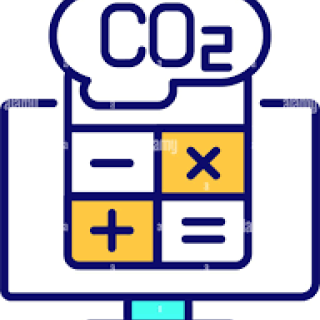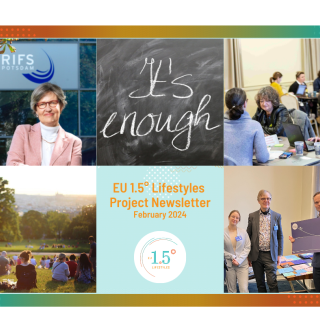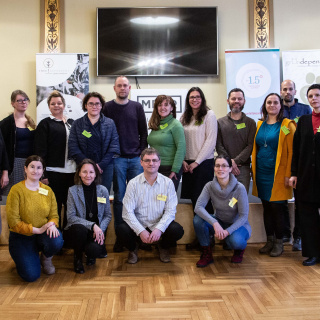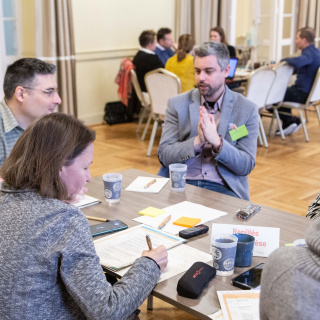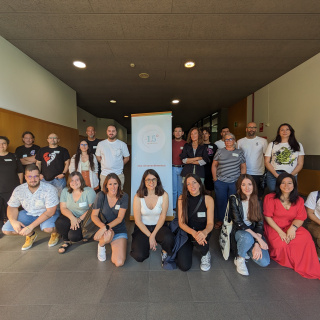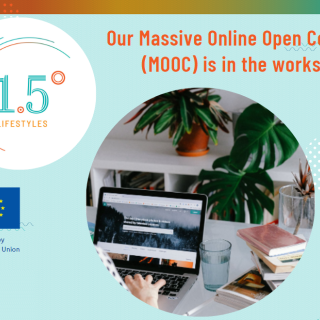Search
Search results
Rethinking business models to support 1.5° lifestyles: Hot highlights from the experts
In recent decades, the private sector has been widely perceived as the primary sector capable of meeting human needs. This view has prevailed at the household, community and national levels. However, the pursuit of profit has led to significant inequalities in access to services, over-consumption of the Earth's resources and environmental degradation, including greenhouse gas emissions. This has raised questions about the ability of existing…
New tender call for carbon calculator development
Due to the insufficient number of tenders submitted to the 28 February 2024 call a new call is published. The deadline for the new call is 30 April 2024.
Ethics & Data Handling
Within the EU 1.5° Lifestyles project we created and collected the principles and guidelines to govern the collection, storage, processing, and sharing of data. The document can be read here.
Tourism and climate justice: When are we going to take the Paris Agreement seriously?
At the end of last year, I was interviewed by the Finnish national broadcasting company YLE. They were interested in the carbon footprint of leisure flights to Finnish Lapland of 800,000 tourists per year. YLE reported a carbon footprint of approximately 600,000 tCO2e for these flights, after having consulted several research and environmental organisations.
Sweden's first citizen assembly on Climate Change
March sees the launch of Sweden's first national citizens' council on climate change. During the spring, 60 randomly selected people will meet on nine occasions to discuss and make proposals on how Sweden can achieve the goals of the Paris Agreement. The first meeting took place on 9-10 March in Stockholm.
Carbon calculator HU-LV
Here are the details for the new call (published on 28 March 2024) development of the Hungarian-Latvian Carbon Calculator tender call.
Deadline for submission is 30 April 2024.
Tender cal documents
- Call text (in pdf)
- Annex 1 - (in pdf)
- Annex 2 - Source Description file (in pdf)
Clarification questions received from potential tender submitters and their answers (dates and answers below):
24 April
- Does the carbon caclulator need to operate only as a website or do we need to develop native application (Mac, Windows, Android, iOS) too?
- The calculator needs to be functional only
Tender calls
In this page we list all the open tenders calls in relation to the EU 1.5° Lifestyles project.
-
MOOC Videos - May 2024, Budapest, Hungary (published on 12 February 2024) - see details here
-
Carbon calculator for Hungary and Latvia (published on 28 February 2024) - NOT VALID
-
Carbon calculator for Hungary and Latvia (published on 28 March 2024) - see details here
Check out the 5th issue of the EU 1.5° Lifestyles newsletter!
In our newsletter we provide regular updates about our research and communication efforts to contribute to mainstreaming 1.5° living. You can read about our continuing Thinking Labs, our latest policy and press release, our publications, inspiration for 1.5° living related this time to traveling and reducing food waste, and a lot more!
Stakeholder Thinking Lab #2 - Hungary
As part of our EU 1.5° Lifestyles project the Hungarian team - together with the other four case countries of Germany, Latvia, Spain, and Swedenis - organized a second phase of Stakeholder Thinking Labs (STL) in Budapest on 30 January 2024.
Stakeholder Thinking Lab #2 - Hungary
As part of our EU 1.5° Lifestyles project the Hungarian team - together with the other four case countries of Germany, Latvia, Spain, and Swedenis - organized a second phase of Stakeholder Thinking Labs (STL) in Budapest.
Co-creating a Sustainable Future with Citizens to Decarbonize the Building Stock in Spain
Improving the energy efficiency of the buildings is one of the main policy objectives of the European policy initiatives, specifically, supporting the energy renovations among the existing building stock to reduce the energy consumption and the emissions. For instance, the European Commission delivered the EU Green Deal proposing a series of policy initiatives to ensure the climate neutrality by 2050 (European Commission, 2019). In the same vein…
RIFS Potsdam seeks offers for filming and video editing in Budapest, Hungary
RIFS Potsdam has issued a call for proposals for the filming of 22 videos and the production of 25 videos for a MOOC course in Budapest, Hungary 13-16 May 2024.



